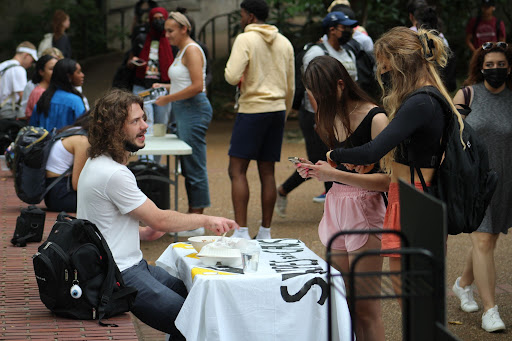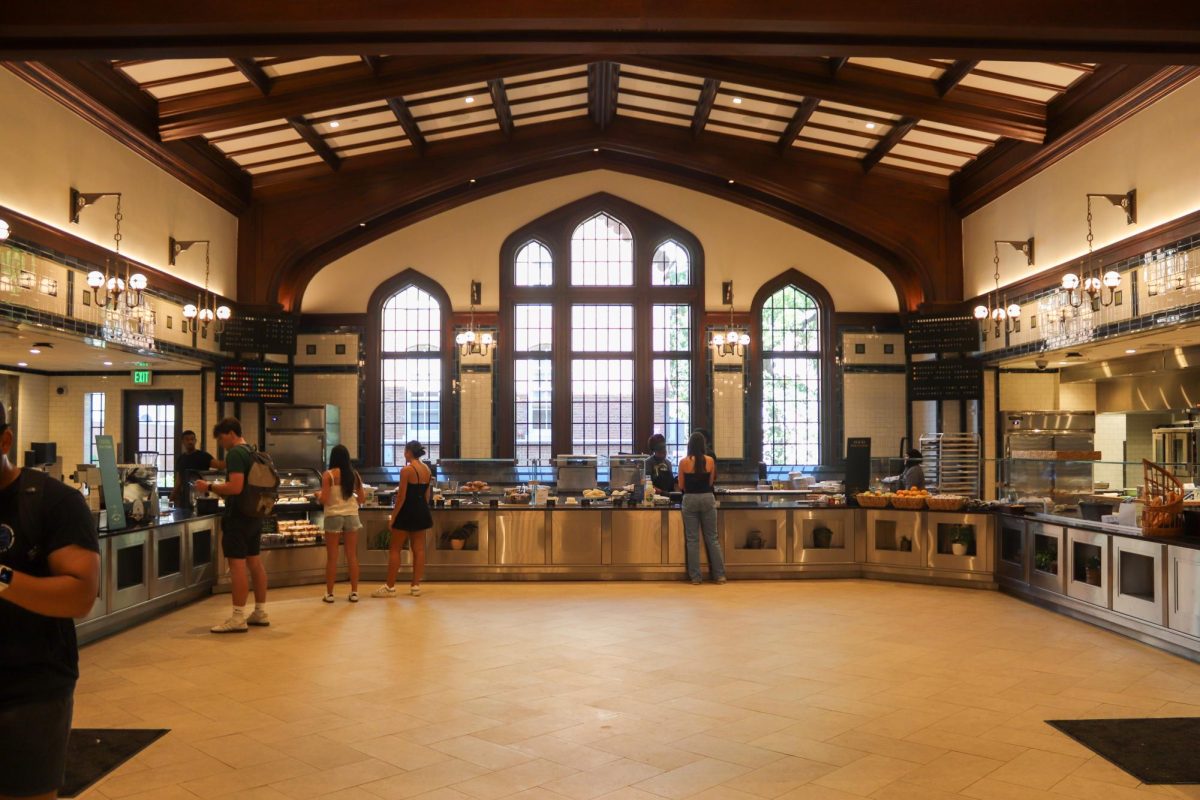The unofficial student-run organization Swipes for a Cause (SFAC) restarted its food donation program on Sept. 14. The Office of Student Accountability, Community Standards and Academic Integrity shut down SFAC’s original donation program on Oct. 27, 2020.
Students can donate their Guest Flex meal swipes or Meal Money by navigating to the “Explore” tab on GET platforms and then scrolling down to “Swipes for a Cause – Meal Donations” or “Swipes for a Cause – Meal Money Donations.” In the re-launched version of SFAC, students can no longer donate unused meal swipes and they are not automatically donated each week.
Every student meal plan includes five Guest Flex meals per semester, which are intended for students to purchase meals for visitors. Students can donate any amount of their Guest Flex meals or donate Meal Money in increments ranging from $1-$20. SFAC will use Guest Flex donations to acquire non-perishable food from Munchie Marts that they will transport to the Second Harvest Food Bank of Middle Tennessee. Meal Money will be sent directly to the nonprofit in the form of a check.
“Five guest meals times 5,000 students a semester is a lot, and every dollar you donate of meal money turns into four meals at the food bank,” SFAC PR and Marketing Lead Bryce Hanson, a sophomore, said.
Before the program was shut down, students could enter their VUnetID, password and Duo code on the SFAC website and then select a number of Meal Swipes to automatically donate per week. As each week progressed, the SFAC algorithm ensured that students had at least three meal swipes per day left, by lowering students’ donation amount if necessary. Per Hanson, SFAC’s original program collected about 400 meals per day, six days a week from September to October 2020.
In their Oct. 27, 2020, email, the Office of Student Accountability told SFAC to “desist from collecting and using other students’ VUNetIDs, passwords, and Duo codes.” Per Hanson, SFAC had discarded student credentials as soon as they were processed, contrary to what the Office of Student Accountability’s message implied.
“I wish that Vanderbilt would allow [SFAC] to operate under the original business model of donating all additional swipes for a week, but, at the very least, I’m thrilled that they’re allowed to continue to operate even if it is conditional,” sophomore Kathyrn Tereshko said.
After being shut down, the SFAC team requested to meet with administration, published an op-ed and started a petition. Per Hanson, SFAC first secured a meeting with the Vanderbilt administration on Feb. 11.
Per Hanson, the SFAC team negotiated with administration about re-starting the program from February to April. Per Hanson, university representatives also expressed concerns that the meal swipe donation program would negatively impact student eating behavior and the university’s dining budget.
“The way their meal plan was set up, they were aware that students weren’t using all their meals, and that the amount of the budget was being reallocated somewhere else,” Hanson said. “By exploiting those extra meal swipes, we were impacting their budget, and that wasn’t what they were comfortable with.”
Campus Dining and the university’s administration did not respond to The Hustler’s request for comment about SFAC.
Per sophomore SFAC Front-end Developer Lead Samuel Sliman, the university agreed in April to allow SFAC to restart under the conditions that SFAC donations would be made through university applications such as the Vanderbilt SSO, the GET app and CBord. The new format of SFAC is similar to previous Guest Meal donation initiatives run by VSG and other organizations, which eventually became defunct, per Sliman.
“We’ve always been fully willing to hand over control of technology and security to [the university], as long as donations still happen,” Sliman said. “We understand that from their end it was a security risk, even though we were being pretty safe about it.”
Sliman said the SFAC team does not currently have access to data about the number of Guest Flex meals or the amount of Meal Money donated. Per Sliman, the university will inform SFAC of the number of meals that they would be responsible for transporting to Second Harvest at the end of the semester.
“The university is in full control of all of the data,” Hanson said. “We are hopeful that we’ll be able to do a little bit of auditing to make sure that the meals and money that is being donated is getting executed properly.”
Per Hanson, due to miscommunication with Vanderbilt administration, SFAC’s relaunch date was pushed from Spring to Fall 2021. To promote their relaunch, SFAC team members set up tables at Rand and Commons from Sept. 14 to Sept. 17. They also marketed the program on social media and through a text database of 530 students who donated to SFAC’s original program.
“Last year, I had seen people posting about the initiative on their Instagram stories, and that’s what prompted me to look into it,” Tereshko said. “Because I donated swipes last year, I got a text last week that Swipes for a Cause was back on campus and I also saw them tabling outside Rand.”
According to Hanson, the SFAC team plans to conduct another marketing push at the end of the Fall 2021 semester. They are also looking to launch meal programs at universities with similar meal plan structures as Vanderbilt’s.
“We feel that we are in the complete, moral right to use the food that we pay for to donate to people who need it. We’ve been working really hard to find any version of this program to push forward,” Hanson said. “There’s a huge amount of impact we can make, but it’s not what it was before.”






